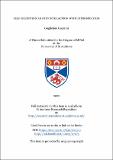Files in this item
Self-deception and its interaction with introspection
Item metadata
| dc.contributor.advisor | Prosser, Simon | |
| dc.contributor.author | Guarrasi, Guglielmo | |
| dc.coverage.spatial | 129 | en_US |
| dc.date.accessioned | 2023-03-28T09:26:49Z | |
| dc.date.available | 2023-03-28T09:26:49Z | |
| dc.date.issued | 2022-06-13 | |
| dc.identifier.uri | https://hdl.handle.net/10023/27275 | |
| dc.description.abstract | Self-deception is a tricky phenomenon to define, especially once we realise the further complications its interaction with introspection might lead to. In this dissertation I am to analyse these two phenomena to show their compatibility. In fact, I am going to argue that, although self-deception is an instance where introspection fails whereas the latter can cause the end of a self-deceive state, no problematic interference happens between them. To reach this aim I am going to rely on the studies conducted by Nisbett and Wilson on instances where subjects fail to introspect certain mental states or processes. I will use this to argue that it is then possible for a subject to fail to introspect certain aspects of their mental life and, thusly, self-deceive. In turn, I am going to show how having areas where introspecting gives us the wrong result is not a major problem as it is a characteristic it shares with sense perception, which is something we are used to rely on. | en_US |
| dc.language.iso | en | en_US |
| dc.subject | Philosophy of mind | en_US |
| dc.subject | Introspection | en_US |
| dc.subject | Self-deception | en_US |
| dc.subject | Knowing ourselves | en_US |
| dc.subject | Consciousness | en_US |
| dc.subject | Irrationality | en_US |
| dc.title | Self-deception and its interaction with introspection | en_US |
| dc.type | Thesis | en_US |
| dc.type.qualificationlevel | Masters | en_US |
| dc.type.qualificationname | MPhil Master of Philosophy | en_US |
| dc.publisher.institution | The University of St Andrews | en_US |
| dc.identifier.doi | https://doi.org/10.17630/sta/371 |
This item appears in the following Collection(s)
Items in the St Andrews Research Repository are protected by copyright, with all rights reserved, unless otherwise indicated.

